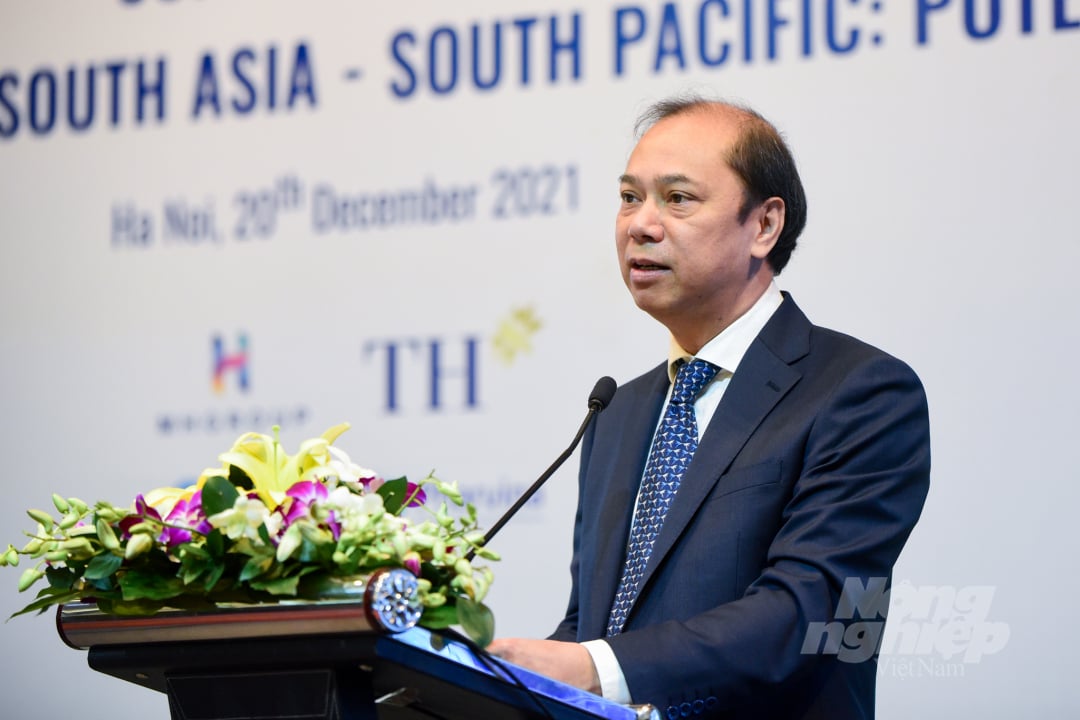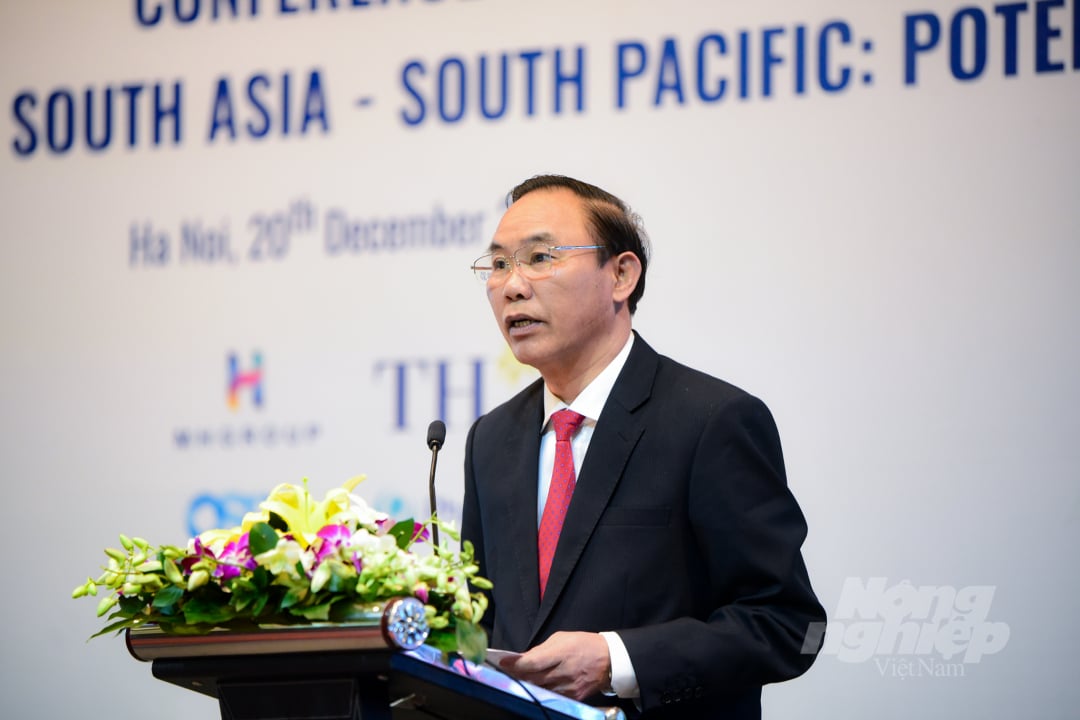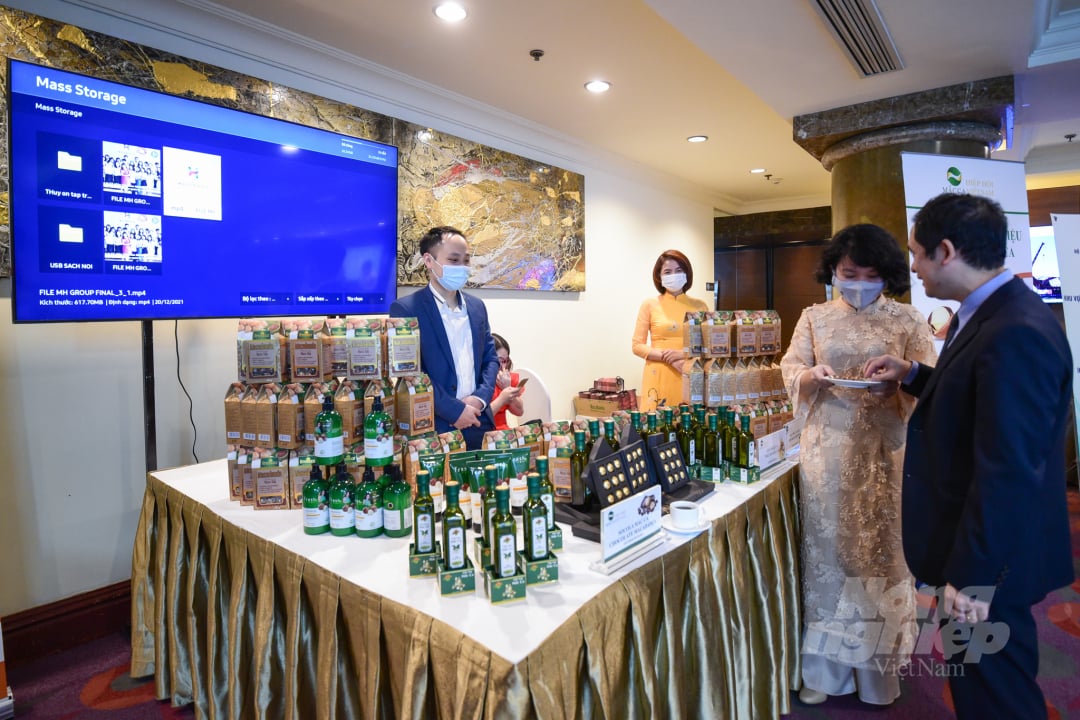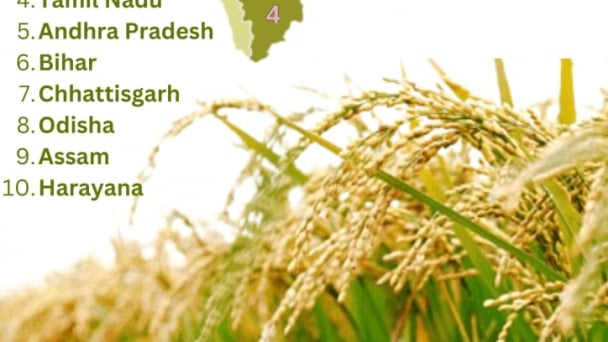June 21, 2025 | 03:25 GMT +7
June 21, 2025 | 03:25 GMT +7
Hotline: 0913.378.918
June 21, 2025 | 03:25 GMT +7
Hotline: 0913.378.918

Deputy Foreign Minister Nguyen Quoc Dung said that with the Halal market, Vietnam is only in the early stages of "paving the path”. Photo: Tung Dinh.
On December 20, the Ministry of Agriculture and Rural Development and the Ministry of Foreign Affairs co-hosted the conference "Halal market in Southeast Asia - South Asia - South Pacific: Potentials and Opportunities," which drew a large number of affiliated units, businesses, associations, and a number of foreign and Vietnamese ambassadors.
Southeast Asia - South Asia - South Pacific is a prospective export market for Halal goods, with a Muslim population of over 860 million people who consume Halal food (66 percent of the total Muslim population in the world).
Southeast Asia - South Asia - South Pacific nations consume the most Halal food in the world, at around USD 470 billion in 2018, with Southeast Asia accounting for USD 230 billion and South Asia - South Pacific contributing for USD 238 billion.
The global Halal food system is expected to grow in scale. According to the Food and Agriculture Organization (FAO) and the Global Islamic Economy Report, spending on Halal food would grow by 3.1 percent, from USD 1.4 trillion in 2020 to USD 1.9 trillion in 2024 and USD 15 trillion in 2050, from USD 1.4 trillion in 2020 to USD 1.9 trillion in 2024.
Not only has the number of Muslims risen, but also new consumer habits have raised demand for Halal items. Numerous non-Muslims are increasing their intake and usage of Halal meals as a result of Halal goods meeting environmental and food safety standards.

Deputy Minister Phung Duc Tien affirmed that the Ministry of Agriculture and Rural Development and the Ministry of Foreign Affairs will have specific action plans to open, connect and support the business community to access the Halal market. Photo: Tung Dinh.
Nguyen Quoc Dung, Deputy Minister of the Ministry of Foreign Affairs, said that the Halal market is thriving at a quick rate across all continents, from Asia, the Middle East, and Africa to Europe and America.
According to the World Halal Forum, the worldwide trade value of Halal food goods is around USD 661 billion, and when non-food products and other Halal services are included, the amount increases to between USD 1,200 and 2,000 trillion every year.
"The Halal market is expected to continue growing significantly in the future years, perhaps reaching USD 15 trillion by 2050, but there is still a roughly 80% gap between global demand and supply of Halal goods," stated Mr. Nguyen Quoc Dung.
Vietnam is rich in raw resources, such include coffee, rice, processed goods, aqua products, spices, beans, and vegetables. Vietnam is also a nation with a diverse export portfolio and significant potential to expand its involvement in the Halal food supply chain in Southeast Asia, South Asia, and the South Pacific in particular, and worldwide in general.
However, the MoFA's head said that Vietnam is just in the very early stages of "paving the way" for the Halal market, having yet to capture a major market share in the aforementioned huge "piece of cake." Each year, over 50 Vietnamese businesses get Halal certification.
"We export about 20 items to the Halal market, a small number in comparison to the enormous potential," Mr. Dung said.

Vietnamese agricultural products are considered suitable and potential for the Halal market. Photo: Tung Dinh.
Phung Duc Tien, Deputy Minister of MARD, said that the approach to the Halal market involves respect for as well as sympathy for their cultural, religious, and belief values, requiring dedication and deep belief.
It is critical to recognize that each product of Vietnamese agriculture may be seen as a bridge of understanding and respect, linking Vietnamese farmers and dealers to friends and colleagues in other Islamic markets. The perspective of tackling market demand while adhering to Halal standards and simultaneously introducing new ideals and orientations for Vietnam's agriculture business.
Mr. Phung Duc Tien said that in order to reach and develop this massive market, in addition to concentrating on policy discourse, directing the production, processing, market, and Halal certification for items is necessary. It is vital to share perspectives and contribute to the development of processes, policies, and their actual application in agro-forestry-fishery.
Additionally, solutions are required to stimulate the sustainable growth of Vietnam's agricultural, forestry, and fisheries value chains in order to serve the Halal market in Southeast Asia, South Asia, and the South Pacific, as well as the worldwide Halal market.
Additionally, Deputy Minister Phung Duc Tien stated that it is necessary to promote the development of a common set of Halal certification standards for agricultural, forestry, and fishery products and Halal certification activities in Southeast Asia, South Asia, and the South Pacific, as well as international cooperation and recognition for the Muslim market worldwide.
"Following this event, MARD and MoFA will develop a specific action plan to open, connect, and assist businesses in accessing the Halal market; at the same time, it is recommended that relevant sectors focus on the fields of service and tourism associated with Halal standards in potential Southeast Asia - South Asia - South Pacific market," Deputy Minister Phung Duc Tien emphasized.
Translated by Linh Linh

(VAN) Last week, the U.S. Department of Agriculture (USDA) released its June World Agricultural Supply and Demand Estimates (WASDE), raising projections for both Indian rice production and U.S. rice imports for the 2025/2026 marketing year.
/2025/06/17/2344-1-131758_261.jpg)
(VAN) Amid tariff risks and growing trade barriers in the U.S. market, Australia is emerging as a promising destination to sustain the growth momentum of Vietnam's shrimp exports.
/2025/06/17/2013-1-nongnghiep-112009.jpg)
(VAN) This notable growth trend reflects the global taste for fresh, nutritious fruits and the expanding use of lychees across various sectors.

(VAN) The political and cultural insulation of Japan’s beloved grain is falling apart, and experts warn the country’s relationship with the staple will have to adapt.

(VAN) Noting risks, report examines impacts of avian influenza, changing trade patterns since 2022, fish fraud, and shipping industry’s net-zero goals.

(VAN) Mr. Tran Quang Bao, General Director of the Forestry and Forest Protection Department, met and worked with the International Wood Products Association to promote cooperation in the field of timber trade.

(VAN) China's outbound shipments of rare earths in May jumped 23% on the month to their highest in a year, though Beijing's export curbs on some of the critical minerals halted some overseas sales.